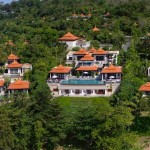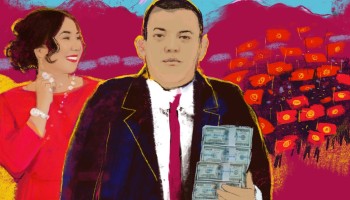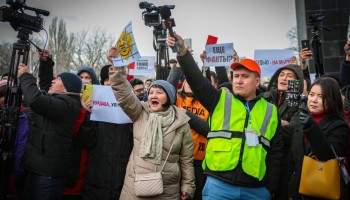Raimbek Matraimov, the former deputy customs chief of Kyrgyzstan who was convicted of large-scale corruption earlier this year, has purchased an elite new apartment in the center of Bishkek, contradicting claims that his criminal sentence had brought him to the brink of financial ruin.
In February 2021, the ex-official pleaded guilty to organizing corruption schemes inside the customs service, several months after he agreed to pay back the government 2 billion Kyrgyz som (US$23.7 million). At the time, his associate said he lacked the resources to cover the compensation.
But OCCRP discovered that on April 22 — just two months after his conviction — Matraimov purchased a second penthouse in the building where he already owned a top-floor apartment. The tony residential complex is located on Erkindik Boulevard in the Kyrgyz capital and features a large, decorative crown on the roof.
The apartment’s sale price is unknown, but a 230-square-meter apartment on a lower floor was listed for roughly $200,000.
The new purchase casts further doubt on the effectiveness of Matraimov’s sentence and the Kyrgyz government’s practice of allowing corrupt officials to avoid jail time by making payments into the state budget.
The circumstances of the purchase also raise questions. Matraimov bought the apartment from a man named Aibek Abdullayev, about whom little is known.
While Abdullayev owned the apartment, the authorities placed restrictions on its sale for unknown reasons. Officials at the Leninsky District Court of Bishkek were unable to explain the situation by publication time. Abdullaev sold the apartment to Matraimov just three days after the restrictions were lifted.
OCCRP was unable to reach Abdullayev for comment. A Matraimov representative did not respond to requests for comment.
Dodgy Deal
This is not the first time Matraimov’s real estate transactions have raised concerns since journalists from OCCRP, Kloop, RFE/RL’s Radio Azattyk, and Bellingcat implicated him in corruption.
In a previous investigation, journalists discovered that Matraimov purchased apartments in old, Soviet-era residential buildings and transferred them to the state to cover part of the nearly US$24 million he agreed to pay in compensation.
The de facto fine, part of an agreement reached between Matraimov and the prosecution, allowed the ex-official to avoid prison time in Kyrgyzstan. The United States later sanctioned Matraimov under its Global Magnitsky Act, making him the first Kyrgyz official on the blacklist.
Elnura Alkanova, a Matraimov associate, claimed that the former customs official had been forced to sell all his property and ask relatives and supporters for money in order to pay off the US$24 million. Some of his family members had even taken out loans to fund the settlement, she said.
Reporters did find that two properties belonging to Matraimov’s nephews were sold around this time. One of them was an apartment in the southern city of Osh; the other was a house in the same city.
But Matraimov’s new real estate purchase suggests that he has not gone bankrupt.
Moreover, he still owns his “old” penthouse in the building on Erkindik Boulevard and his apartment in Osh.
Who is Matraimov?
Raimbek Matraimov — the subject of a series of investigations by OCCRP, RFE/RL’s Radio Azattyk, Kloop, and Bellingcat about corruption and contraband in Central Asia — was a powerbroker in Kyrgyzstan until 2020, when mass protests brought about a change of government.
Before the revolution, the customs official appeared to enjoy the support of the government, despite reporters implicating him in smuggling Chinese goods and cooperation with Khabibula Abdukadyr, a shadowy and influential businessman in the cargo trade.
Meanwhile, Matraimov’s supporters and members of his family were preparing to enter parliament under the banner of Mekenim Kyrgyzstan, a political party that took second place during the 2020 election.
The results were later overturned after Kyrgyz citizens dissatisfied with the vote ousted the government.
Clarification, June 9, 2021: The headline of this story has been updated to more accurately reflect the nature of Matraimov's payment to the Kyrgyz government.







